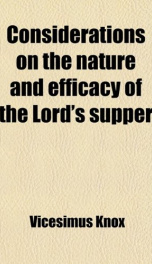considerations on the nature and efficacy of the lords supper

Purchase of this book includes free trial access to www.million-books.com where you can read more than a million books for free. This is an OCR edition with typos. Excerpt from book: SECTION IV. The Opinion that the Eucharift is a bare Memorial, confidered. . . . the opinion of Bimop.Hoad- ley, ' that the Sacrament of the .Lord's ' Supper is but a bare memorial,' has been repeatedly refuted, yet it is faid to gain ground, and to be likely to prevail more and more, in an age when the whole of our Religion is reprefented by the Sect of felf-named Rationalifts, the modern Socinians, as totally devoid of every thing myfterious. This notion of a bare memorial, it is obferved, recommends itfelf by its fim- plicity. Every body can underftand what is meant by an act of commemoration. The idea is perfectly familiar. We keep a birth-day in our families, and we remember public events in anniverfary fefti- vals. To receive the Sacrament as a mere commemorative act, like thefe in common life, requires no peculiar grace of Chriftianity, no examination of the heart, no preparatory difcipline. The remembrance of a friend at a convivial table, is an act nearly as religions and as virtuous as the reception of the Sacrament, according to the ideas of thofe who affirm that it is nothing more than an act of memory, performed with fome formalities indeed, which however, as far as any benefits to ourfelves are received, might as well be omitted, if they had not been pofitively commanded. They fometrmes fuggeft a hint that the command to perform this flight fervice may poffibly not extend to us in thefe days, but might have been confined to the Apoftles, to whom it was immediately given by the Irrftitutor. Dr. Bell, whom I am forry to quote fo often, inftructs his difciples thus: " -Should any one," fays he, " be fincerely " 'convinced that the Lord's Supper was " not inftituted for a ftanding rite of " -his rdigion, but merely for the ob- " fervance of the Apoftles themf...
Info about the book
Author:
Series:
Unknown
ISBN:
0195179692
Rating:
3.5/5 (1)Your rating:
0/5
Languge:
English
Users who have this book
Users who want this book
What readers are saying
What do you think? Write your own comment on this book!
write a commentif you like considerations on the nature and efficacy of the lords supper try:
Do you want to read a book that interests you? It’s EASY!
Create an account and send a request for reading to other users on the Webpage of the book!


